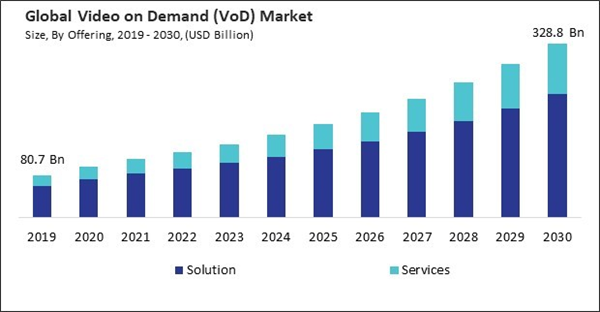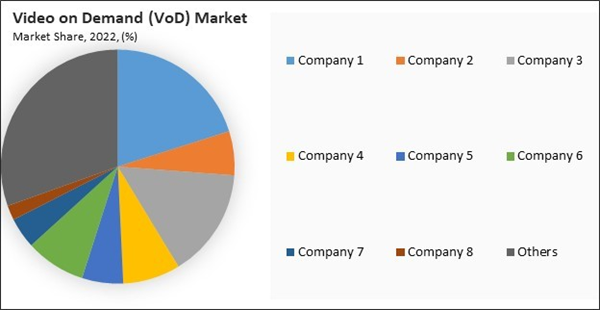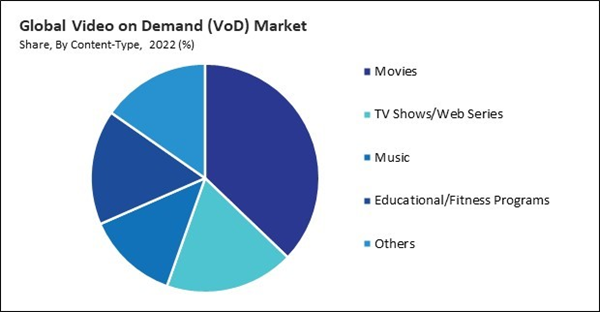Government agencies often need to provide training programs and educational content to their employees. VoD platforms offer a convenient and efficient way to deliver training materials, educational videos, and other relevant content. Consequently, the government and public sector segments would generate approximately 13.70 % share of the market by 2030. VoD services can be used for internal communication within government organizations. Hence, owing to these factors, there will be increased demand in the segment.
High-speed internet enables users to stream content in high definition (HD), Ultra HD (4K), and even higher resolutions without buffering or interruptions. This enhances the overall viewing experience, attracting users who value high-quality visuals. Thus, these factors can assist in the expansion of the market.
Additionally, Subscription-based models offer video-on-demand (VoD) service providers a consistent and anticipated revenue stream. Monthly subscription fees create a consistent income stream, allowing platforms to plan and invest in content creation, infrastructure, and service improvements. Therefore, these factors can fuel the demand for the video on demand (VoD) services in the coming years.
However, High-demand content, especially popular movies, TV shows, and original productions, often have a considerable price tag. As multiple streaming services compete for the rights to such content, bidding wars can increase costs. Platforms strive to differentiate themselves by offering exclusive content. However, acquiring exclusive rights can be costly, and securing a diverse range of exclusive content to appeal to a broad audience adds to the financial burden. Thus, these aspects can hamper the growth of the market.
The leading players in the market are competing with diverse innovative offerings to remain competitive in the market. The above illustration shows the percentage of revenue shared by some of the leading companies in the market. The leading players of the market are adopting various strategies in order to cater demand coming from the different industries. The key developmental strategies in the market are Acquisitions, and Partnerships & Collaborations.
By Deployment Model Analysis
On the basis of deployment model, the market is bifurcated into cloud and on-premises. In 2022, the on-premises segment witnessed a substantial revenue share in the 39.13% market. On-premises solutions can offer better performance and lower latency compared to cloud-based alternatives. This is crucial for VoD services, as users expect quick and seamless access to high-quality content. Depending on a business's specific needs and usage patterns, an on-premises solution may be more cost-effective in the long run, especially for large enterprises that can achieve economies of scale.By Offering Analysis
Based on offering, the market is segmented into solutions and services. The solution segment held the 74.29% revenue share in the market in 2022. As more people worldwide gain access to high-speed internet and digital devices, the consumer base for VoD services is expanding. This surge in users is driving the need for robust and scalable solutions to meet the increasing demand for content. Solutions providers are constantly innovating to enhance the quality and efficiency of video streaming, attracting both consumers and content creators.By Solutions Analysis
The solution segment is further segmented into pay TV, OTT, and IPTV. In 2022, the OTT segment witnessed the 44.55% revenue share in the market. Many over the top (OTT) platforms invest heavily in producing original content and securing exclusive licensing agreements. Original series and exclusive movies can be major drawcards, encouraging viewers to subscribe to platforms that offer unique and premium content not available elsewhere. Hence, the segment will expand rapidly in the coming years.By Platform Type Analysis
On the basis of platform type, the market is divided into smartphones, tablets/laptops, smart TVs, and others. In 2022, the smart TVs segment witnessed a 18.7% revenue share in the market. Increasing smart home trends have led to increased adoption of smart TVs. Smart TVs offer built-in apps and easy navigation, making accessing various streaming services convenient. As per the data from the Government of China, the country’s smart home industry experienced a substantial development rate of nearly 20 percent annually from 2016 to 2021, expanding from 260 billion yuan ($36.25 billion) to 580 billion yuan. Hence, these aspects will pose lucrative growth prospects for the segment.By Content-Type Analysis
By content-type, the market is segmented into movies, music, TV shows/web series, educational/fitness programs, and others. The movies segment procured the 37.14% revenue share in the market in 2022. VoD services offer an extensive and varied collection of films, encompassing timeless classics and contemporary releases. This extensive selection caters to various tastes and preferences, attracting a wider audience. Many VoD platforms invest heavily in producing original movies and exclusive content.By Monetization Model
Based on monetization model, the market is divided into subscription video on demand (SVoD), transactional video on demand (TVoD), advertising-supported video on demand (AVoD), free Ad-supported streaming TV (FAST), and others., the transactional video on demand (TVoD) segment witnessed a 21.25% revenue share in the market. TVoD allows users to manage their entertainment expenses more efficiently. Instead of paying a monthly subscription fee, viewers can selectively pay for the content they are interested in, controlling their overall spending on digital entertainment. TVoD platforms often provide access to the latest movie releases shortly after they leave theaters.By Vertical Analysis
Based on vertical, the market is segmented into BFSI, education, government & public sector, healthcare & life sciences, media & entertainment, and others. In 2022 The media and entertainment segment witnessed a 48.05% revenue share in the market. VoD platforms have invested heavily in producing original content, including movies, series, and documentaries. Exclusive content attracts subscribers and enhances the competitive edge of these platforms. Consumers are willing to pay for access to a vast content library without the need for traditional cable or satellite subscriptions.By Regional Analysis
By region, the market is segmented into North America, Europe, Asia Pacific, and LAMEA. In 2022, the Europe segment acquired a 30.1% revenue share in the market. The increasing availability and adoption of high-speed internet across Europe have facilitated the growth of online streaming services. Consumers increasingly prefer on-demand content over traditional broadcasting, allowing them to watch content conveniently. Therefore, these factors can help in the expansion of the segment.Recent Strategies Deployed in the Market
- 2024-Feb: Viacom 18 Media Private Ltd., a subsidiary of Reliance Industries Ltd., entered into a agreement with The Walt Disney Company, an American multinational mass media and entertainment conglomerate. Through this agreement, both entities aimed to establish a joint venture merging the operations of Viacom18 and Star India in India, ushering in a transformative phase in the Indian entertainment industry.
- 2022-Mar: The Walt Disney Company introduced an Ad-Supported Video on Demand service within its direct-to-consumer segment. With this launch, Disney aimed to achieve a subscriber base target exceeding 230 million by 2024.
- 2021-Jul: Sony Pictures Networks India Private Limited, a subsidiary of Sony Corporation, has forged a partnership with Tata Consultancy Services Limited, an Indian multinational information technology services, and consulting company. Through this collaboration, SonyLIV aims to harness TCS's next-generation digital capabilities to enhance its core OTT platform. This enhanced platform will leverage AI and machine learning to deliver personalized experiences to subscribers across various devices. Additionally, it will assist SonyLIV in utilizing data and insights to monetize content effectively and create new revenue streams.
- 2019-Jun: Sony Pictures Networks India Private Limited, a subsidiary of Sony Corporation, formed a collaboration with Epic Television Networks Private Limited, an Indian television company known for its action, drama, comedy, and narrative non-fiction and fictional programming centered around Indian history. Through this partnership, SonyLiv aimed to grant its users 24/7 access to the live stream of EPIC Channel's content anytime and from anywhere.
- 2019-Apr: The Walt Disney Company unveiled Disney+ in the U.S. market, offering it at a monthly price of $6.99. This subscription video-on-demand (SVOD) service marks Disney's significant and assertive entry into the video-streaming competition. The launch of Disney+ launched a subscriber base of 60 million to 90 million worldwide by the end of fiscal 2024.
List of Key Companies Profiled
- Netflix, Inc.
- Amazon.com, Inc.
- Google LLC (Alphabet Inc.)
- The Walt Disney Company
- Apple, Inc.
- Comcast Corporation
- Sony Corporation
- Kaltura, Inc.
- Muvi
- Reliance Industries Limited
Market Report Segmentation
By Deployment Model- Cloud
- On-premises
- Solution
- OTT
- Pay TV
- IPTV
- Services
- Smartphones
- Tablets/Laptops
- Smart TVs
- Others
- Movies
- TV Shows/Web Series
- Music
- Educational/Fitness Programs
- Others
- Subscription Video on Demand (SVoD)
- Transactional Video on Demand (TVoD)
- Advertising-Support Video on Demand (AVoD)
- Free Ad-Supported Streaming TV (FAST)
- Others
- Media & Entertainment
- Government & Public Sector
- Education
- Healthcare & Lifesciences
- BFSI
- Others
- North America
- US
- Canada
- Mexico
- Rest of North America
- Europe
- Germany
- UK
- France
- Russia
- Spain
- Italy
- Rest of Europe
- Asia Pacific
- China
- Japan
- India
- South Korea
- Singapore
- Malaysia
- Rest of Asia Pacific
- LAMEA
- Brazil
- Argentina
- UAE
- Saudi Arabia
- South Africa
- Nigeria
- Rest of LAMEA
Table of Contents
Companies Mentioned
- Netflix, Inc.
- Amazon.com, Inc.
- Google LLC (Alphabet Inc.)
- The Walt Disney Company
- Apple, Inc.
- Comcast Corporation
- Sony Corporation
- Kaltura, Inc.
- Muvi
- Reliance Industries Limited











